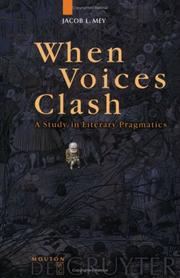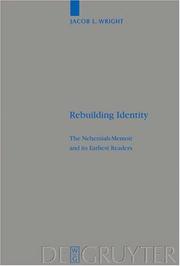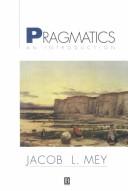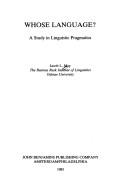| Listing 1 - 10 of 28 | << page >> |
Sort by
|

ISBN: 3110158205 3110158213 3110801418 9783110801415 9783110158205 Year: 1999 Volume: 115 Publisher: Berlin: de Gruyter,
Abstract | Keywords | Export | Availability | Bookmark
 Loading...
Loading...Choose an application
- Reference Manager
- EndNote
- RefWorks (Direct export to RefWorks)
Discourse analysis, Literary. --- Literature --- Pragmatics --- Discourse analysis, Literary --- Discours littéraire --- Literary discourse analysis --- Rhetoric --- Literary style
Book
ISBN: 9027221014 Year: 1985 Publisher: Amsterdam : Benjamins,
Abstract | Keywords | Export | Availability | Bookmark
 Loading...
Loading...Choose an application
- Reference Manager
- EndNote
- RefWorks (Direct export to RefWorks)
Sociolinguistics --- Pragmatics --- 801.56 --- Syntaxis. Semantiek --- 801.56 Syntaxis. Semantiek

ISBN: 3110183196 3110927209 9783110927207 9783110183191 Year: 2004 Volume: 348 Publisher: Berlin: de Gruyter,
Abstract | Keywords | Export | Availability | Bookmark
 Loading...
Loading...Choose an application
- Reference Manager
- EndNote
- RefWorks (Direct export to RefWorks)
Monograph. The composition of Nehemiah's first-person account. Judah in the Persian and Hellenistic periods. The wall of Jerusalem as a symbol of separation. The literary development of Ezra-Nehemiah. Criticism of the priesthood and aristocracy. Temple and Torah.
Bible. --- Criticism, interpretation, etc --- Esdras (Book 2, Vulgate) --- Nehemiah (Book of the Old Testament) --- Neḥemyah (Book of the Old Testament) --- Criticism, interpretation, etc. --- Jerusalem /Religion. --- Nehemia (Buch). --- Nehemia. --- Textkritik. --- Textgeschichte --- RELIGION / Biblical Criticism & Interpretation / Old Testament. --- Textüberlieferung --- Überlieferung --- Überlieferungsgeschichte --- Text --- Literatur

ISBN: 0631186913 0631186891 9780631186915 Year: 1993 Publisher: Oxford : Blackwell,
Abstract | Keywords | Export | Availability | Bookmark
 Loading...
Loading...Choose an application
- Reference Manager
- EndNote
- RefWorks (Direct export to RefWorks)
801.56 --- 801.56 Syntaxis. Semantiek --- Syntaxis. Semantiek --- Pragmatics --- Pragmalinguistics --- General semantics --- Language and languages --- Logic, Symbolic and mathematical --- Semantics (Philosophy) --- Philosophy --- Pragmatics. --- Pragmatique
Book
ISBN: 110869151X 1108480896 1108574300 1108575897 Year: 2020 Publisher: Cambridge : Cambridge University Press,
Abstract | Keywords | Export | Availability | Bookmark
 Loading...
Loading...Choose an application
- Reference Manager
- EndNote
- RefWorks (Direct export to RefWorks)
The Hebrew Bible is permeated with depictions of military conflicts that have profoundly shaped the way many think about war. Why does war occupy so much space in the Bible? In this book, Jacob Wright offers a fresh and fascinating response to this question: War pervades the Bible not because ancient Israel was governed by religious factors (such as 'holy war') or because this people, along with its neighbors in the ancient Near East, was especially bellicose. The reason is rather that the Bible is fundamentally a project of constructing a new national identity for Israel, one that can both transcend deep divisions within the population and withstand military conquest by imperial armies. Drawing on the intriguing interdisciplinary research on war commemoration, Wright shows how biblical authors, like the architects of national identities from more recent times, constructed a new and influential notion of peoplehood in direct relation to memories of war, both real and imagined. This book is also available as Open Access on Cambridge Core.
War --- Jews --- Nationalism and collective memory --- National characteristics, Israeli. --- Biblical teaching. --- Religious aspects --- Judaism. --- Christianity. --- Identity. --- Bible. --- Socio-rhetorical criticism. --- Criticism, interpretation, etc. --- Palestine --- In the Bible. --- Israeli national characteristics --- Collective memory and nationalism --- Collective memory --- Identity, Jewish --- Jewish identity --- Jewishness --- Jewish law --- Jewish nationalism --- Christianity and war --- War and Judaism --- Ethnic identity --- Race identity --- Legal status, laws, etc. --- Antico Testamento --- Hebrew Bible --- Hebrew Scriptures --- Kitve-ḳodesh --- Miḳra --- Old Testament --- Palaia Diathēkē --- Pentateuch, Prophets, and Hagiographa --- Sean-Tiomna --- Stary Testament --- Tanakh --- Tawrāt --- Torah, Neviʼim, Ketuvim --- Torah, Neviʼim u-Khetuvim --- Velho Testamento --- Biblical Studies --- Judaism --- Theology --- Religious Studies --- memory studies
Book
ISBN: 3030509397 3030509389 Year: 2020 Publisher: Cham, Switzerland : Palgrave Macmillan,
Abstract | Keywords | Export | Availability | Bookmark
 Loading...
Loading...Choose an application
- Reference Manager
- EndNote
- RefWorks (Direct export to RefWorks)
‘Jacob L. Bender’s Modern Death in Irish and Latin American Literature is a remarkable exploration of the spectral in the broad Atlantic world. His argument moves beyond boundaries of land and sea to reveal the nuanced union of Irish, Caribbean, and Latin American peoples and cultures. Bender’s unique focus shows just what an intimate part of the writing life death is for artists like Joyce, Borges, Carpentier, and Beckett.’ — Maria McGarrity, Long Island University, USA, and author of Washed by the Gulf Stream: The Historic and Geographic Relation of Irish and Caribbean Literature (2008) ‘Modern Death in Irish and Latin American Literature examines an array of texts from different countries including Puerto Rico, Mexico, Colombia and Argentina, comparing them with key works from the Irish literary tradition. This transatlantic focus makes for an engrossing study and the readings of the texts are persuasive and compelling. Bender’s study teases out the rich complexities of Irish and Latin American shared conceptualisations of death and illuminates the ways in which symbolic representations of the dead can act as mechanisms through which hegemonic discourses are disrupted, and erased voices may come to the fore. It promises to be a lasting contribution to scholarship on all of the individual authors featured while prompting additional comparative readings of literary conceptualizations of death in these and other contexts.’ — Nuala Finnegan, University College Cork, Ireland, and Society for Irish Latin American Studies (SILAS) This comparative literature study explores how writers from across Ireland and Latin America have, both in parallel and in concert, deployed symbolic representations of the dead in their various anti-colonial projects. In contrast to the ghosts and revenants that haunt English and Anglo-American letters—where they are largely either monstrous horrors or illusory frauds—the dead in these Irish/Latinx archives can serve as potential allies, repositories of historical grievances, recorders of silenced voices, and disruptors of neocolonial discourse.
Literature. --- Latin American literature. --- European literature. --- Comparative literature. --- Literature, general. --- Latin American/Caribbean Literature. --- European Literature. --- Comparative Literature. --- Comparative literature --- Literature, Comparative --- Philology --- European literature --- Belles-lettres --- Western literature (Western countries) --- World literature --- Authors --- Authorship --- History and criticism --- English literature --- Irish literature --- Latin American literature --- Irish authors --- History and criticism.

ISBN: 128335909X 9786613359094 9027279535 9789027279538 9027250049 9789027250049 0915027615 9780915027613 Year: 1985 Volume: 3 Publisher: Amsterdam : Benjamins,
Abstract | Keywords | Export | Availability | Bookmark
 Loading...
Loading...Choose an application
- Reference Manager
- EndNote
- RefWorks (Direct export to RefWorks)
""For the colonized person, objectivity is always directed against him"" (Frantz Fanon). Colonized persons do not live on what we call (or used to call) the ""colonies"" alone. In general, objective reality, or the ""facts of life"", are very different depending on the kind of life you can afford. This goes for language as well; and it explains both the title of this book, and gives it its ""raison d'être"". It deals with power in language, and asks: Who is really in command when we use ""our"" language? And why does it make sense to talk about a language of power (or lack of it)? The p
Pragmatics. --- Sociolinguistics. --- Language and languages --- Language and society --- Society and language --- Sociology of language --- Language and culture --- Linguistics --- Sociology --- Integrational linguistics (Oxford school) --- Pragmalinguistics --- General semantics --- Logic, Symbolic and mathematical --- Semantics (Philosophy) --- Social aspects --- Sociological aspects --- Philosophy --- Pragmatics --- Sociolinguistics --- Pragmatique --- Sociolinguistique --- Taal / en matschappij. --- Taal. Sociologie. --- Pragmatique. --- Langage / et société. --- Langage. Sociologie. --- Pragmatiek.
Book
ISBN: 1282480596 9786612480591 144220138X 9781442201385 9781282480599 9781442201361 1442201363 6612480599 Year: 2009 Publisher: Lanham [etc.] Rowman & Littlefield
Abstract | Keywords | Export | Availability | Bookmark
 Loading...
Loading...Choose an application
- Reference Manager
- EndNote
- RefWorks (Direct export to RefWorks)
Immigration has always caused immense public concern, especially when the perception is that immigrants are not assimilating into society they way they should, or perhaps the way they once did. But is this truly a modern phenomenon? In From Immigrants to Americans, Jacob Vigdor offers a direct comparison of the experiences of immigrants in the United States from the mid-19th century to the present day. His conclusions are both unexpected and fascinating. This is an important book for anyone interested in immigration, either the history or the modern implications, or who want to understand why
Immigrants --- Americanization. --- Assimilation (Sociology) --- Cultural assimilation --- Anthropology --- Socialization --- Acculturation --- Cultural fusion --- Emigration and immigration --- Minorities --- Civics --- Social conditions. --- United States --- Emigration and immigration. --- Immigration --- Social conditions --- Americanization
Book
ISBN: 9781575067384 1575067382 1646020758 9781646020775 1646020774 Year: 2020 Publisher: University Park, Pennsylvania : Eisenbrauns,
Abstract | Keywords | Export | Availability | Bookmark
 Loading...
Loading...Choose an application
- Reference Manager
- EndNote
- RefWorks (Direct export to RefWorks)
"A comprehensive study of the workings of the administrative machinery of the Ur III state (ca. 2100-2000 BC), based on approximately 250 cuneiform tablets translated into English"--
Sumerian language --- Cuneiform inscriptions, Sumerian --- Schøyen Collection. --- Ur (Extinct city) --- Politics and government. --- Sumerian cuneiform inscriptions --- Schøyen Collection of Western Manuscripts --- Muqayyar, Tall al- (Iraq) --- Tall al-Muqayyar (Iraq) --- Tell el-Mukayyar (Iraq) --- Tell el-Muqayyar (Iraq) --- Ur (Ancient city) --- Ur of the Chaldees (Extinct city) --- Urim (Extinct city) --- Iraq --- Antiquities

ISBN: 9783110815689 3110815680 9027977577 Year: 2017 Publisher: Berlin ; Boston : De Gruyter Mouton,
Abstract | Keywords | Export | Availability | Bookmark
 Loading...
Loading...Choose an application
- Reference Manager
- EndNote
- RefWorks (Direct export to RefWorks)
| Listing 1 - 10 of 28 | << page >> |
Sort by
|

 Search
Search Feedback
Feedback About UniCat
About UniCat  Help
Help News
News